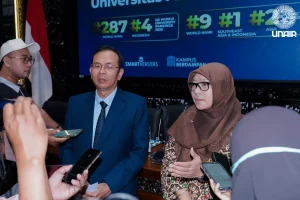UNAIR NEWS – Garuda Mukti Hall witnessed an emotional and proud moment on Wednesday morning, June 8, 2022. Prof Dr Mas Rahmah SH MH LLM has been inaugurated as one of UNAIR professors, the highest academic rank.
Professor Mas Rahmah was inaugurated as a professor in Intellectual Property Rights (HKI). During her scientific oration, the professor elaborated her research on “Intellectual Property Rights (IPR) Reformation Trilogy: Digital Innovation, Startup, and Creative Economy Development.”
Professor Rahmah said that the digital era brings great disruption to intellectual property rights. The limitless internet makes IPR very easy to be violated. It is also difficult to identify the perpetrators due to the transnational nature of violations.
“The rise of IPR violations shows a conflict between HKI protection and resistance to the system,” said the Head of the Center for Intellectual Property Studies of UNAIR Faculty of Law.
IPR and its business benefits
The basic premise of IPR is an exclusive right for the result of thinking and intellectual abilities, reason, and human rationality. Professor Rahmah said that IPR provides exclusive law protection on the results in the form of copyrights, patents, and trademarks.
“The justification for this IPR is rooted in two aspects. The first is occupancy, in which someone who finds work is entitled to exclusive use of the work. The second is labor theory which refers to the recognition of economic benefits for creators/inventors who have worked hard to produce something,” said the Monash University alumnae.
Professor Rahmah said that the presence of IPR may strengthen the economic growth dominated by startup and economic creativity. IPR ignites innovative creation in business. Besides, IPR may protect and acquire the economic benefits of innovation. Every business will have its characteristics, which is a good thing in business competition.
IPR Resistance
However, Rahmah explained that the premise of IPR faces resistance as the right exclusivity is considered monopolistic. The system tends to provide benefits to the owner and causes them to ignore the community’s interests to access the products protected by these rights. Hence, the resistance triggers the widespread neglect and violation of IPR in the digital world.
“There is an ideological conflict between IPR and digital culture. While IPR is private and individualistic, the digital world demands the freedom of IPR, in which digital creations become accessible to public information. It is known as the freedom of access,” said the Head of Publication Division of the Association for Intellectual Property Rights.
How to balance it?
In her research, Professor Rahmah concluded that there must be a balance between the interests of IPR owners and the community’s fundamental rights to accessing information. There must be a substantial reformation trilogy in the substantials and law enforcement, non-legislative and non-litigation resolutions, and education development to achieve in the IPR system.
“This principle is regulated in Article 7 of the TRIPs Agreement, which stipulates that the protection and enforcement of intellectual property rights must contribute to technological innovation, transfer, and dissemination of technology for welfare. It is also regulated in Article 43-49 of Copyright Law, which expands public access opportunities for educational purposes,” she concluded. (*)
Author: Pradnya Wicaksana
Editor: Binti Q. Masruroh









